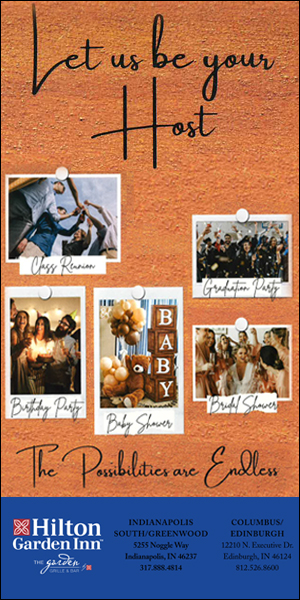
By Anne Kendall // Photography Submitted
It was the summer of 2017, and Kelly Harmon had been trudging through a personal rough patch. But instead of sinking further into depression or self-pity, she summoned all her energy to step forward when she ran across an intriguing task: a seven-day acts of kindness challenge. Which was pretty much just what it sounds like — pushing herself to do something nice, for someone, every day for a week. And if she failed? Nobody had to know but her.
It turned her life around.
“Acts of kindness gave me purpose, calmed me and made me happy to do things for others,” says Harmon, who lives in rural Franklin and works as a senior client service associate at a downtown Indianapolis wealth management firm. “Once I was finished, I decided to try to inspire others to participate in their own acts of kindness as well.”
The breakthrough: realizing that when she went out of her way for others, not only did they benefit, but so did she, through emotional and even physiological benefits. It’s called the “helper’s high,” and according to research from Emory University, it’s because when you are kind to another person, your brain’s pleasure centers light up, as if you were the recipient of the good deed yourself.
Numerous studies have shown that even just witnessing acts of kindness ups the production of serotonin, a neurotransmitter that regulates mood in the brain.
Which may be why we tend to complain about how the news is always negative, without enough of the “good stuff” — the stories of love and kindness that uplift us, maybe more significantly than we realize.
One recent tale of kindness did make the news: when Richard’s Brick Oven Pizza in Franklin, concerned about the economic effect of the coronavirus on the local community, served free food to hundreds of people this spring. Besides dishing it out to drivers who pulled up in the parking lot, the pizzeria delivered food to at least 50 hungry people a day through Johnson County Senior Services.
Not long before the pizza giveaway, John Shafer collaborated with J.B. Parker Flowers to spread botanical joy to neighbors he sensed could use a boost. An avid flower arranger who had taken classes from the store’s Pam Parker before, he called her when the coronavirus hit hard.
“I said, ‘I know COVID has almost shut you down. Would you happen to have any flowers left in your cooler?’ and she said, ‘Absolutely. Bring your SUV down,’” says Shafer, director of the counseling center at Franklin College. “So I had hundreds of stems. I made 15 or 20 arrangements and left a few of them on the front doorsteps of people in town who are elderly. I also delivered them to some nursing homes here in Franklin and to some people who were just down on their luck and I thought needed some joy.”
Despite the enormity of wrangling hundreds of flowers into gifts, Shafer genuinely enjoyed doing it, especially with the end game in sight. “Delivering them to people where I know it’s going to make a difference totally makes me feel better,” he says. “It’s definitely reciprocal. It comes back to bless us. When we do kind things for others and we see others smile, there’s this sense of lifting ourselves up and feeling like we’re contributing to society.”
If you’re a veteran or a soldier in uniform sitting down to eat, and Shafer is in that restaurant, your bill will be paid for, and you’ll probably never know by whom. “It probably makes them feel like our country cares about them,” says Shafer, “and a small act like that can impact a person’s day.”
Sometimes the act isn’t even an action at all, but a moment of understanding, and giving someone else the benefit of the doubt. Shafer has been recovering from COVID-19 in recent weeks, giving him plenty of time to reflect on life.
“The word that comes to my mind is ‘grace,’” he says. “I think of grace and kindness synonymously. I think the world is a pretty dark place right now, and the more grace and forgiveness, the better. Even a small thing, like if somebody cuts me off in traffic, instead giving them the finger, I tell myself, I don’t know where they’re coming from.”
These are the kinds of stories that prompted Harmon to found Facebook and Instagram pages for “Franklin Random Acts of Kindness” a few years ago, when she was in the throes of discovering the joy of doing things for others. The purpose of the pages is for anyone to share their stories of kindness — giving or receiving it — perhaps inspiring copycats. Harmon and her sister and nieces (ages 11 and 5) have been the driving forces behind the pages, posting upbeat messages and thoughts on kindness when they don’t have specific stories to pass along.
One thing Harmon loves about random acts of kindness and what makes them so contagious is that they’re so incredibly easy. There’s no commitment, like signing up to be somewhere for volunteer work every Tuesday night at 7 p.m. There doesn’t even have to be much thought involved, though sincerity is important. “You can just tell someone hello and that you like their hair,” says Harmon. “It could make their day. You never know what they are going through.”
Anyone, anywhere can do this almost anytime, and the acts can be big or small. Holding the door for someone else. Sending a random “hello” text to someone you haven’t talked to in a while. Being the person who brings bagels to work on a gloomy Tuesday morning. Smiling at everyone. Helping an elder with groceries. Listening — really listening — to a friend.
“It is one of the most amazing and powerful forces of good that exists,” says Harmon. One thing’s for sure, says therapist Joanna Bloss, as the old song goes, what the world needs now is love.
“People are coming into my office feeling more judged and beaten up right now,” says Bloss, who practices in old town Greenwood. “When we extend kindness, there’s a mutual calming down. Our nervous systems respond well to that. Our brains change when we treat people respectfully, and we get that in return.”
Bloss finds herself “constantly” counseling patients in being kinder to themselves, which almost invariably translates to being kinder to others. People can be way harder on their own perceived mistakes, talking to themselves more harshly than they ever would to a friend: “You idiot! How could you do something so stupid?”
“When people are unhappy internally, that’s going to translate into how they treat others,” she says. And by the same token, easing up on everyone leads to happier moods all around.
“The key is getting outside of ourselves,” says Bloss. “If I buy a drink at Starbucks and let someone go ahead in line, I’m certain there’s a little improvement in brain chemistry. We’ve stepped outside and formed a connection, however small, and it definitely has that ripple effect. Hopefully, the next person will pay it forward.”


